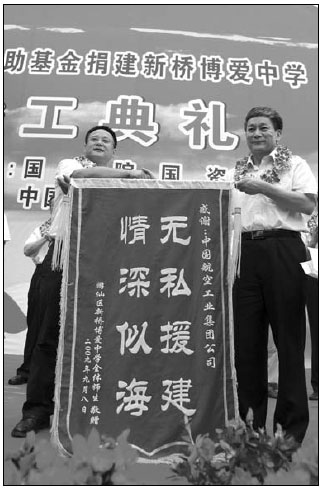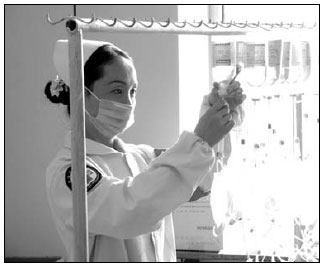Aviation Special :AVIC: Ensuring China's peaceful development
|
Yan Chao (left), a Mianyang official, presents a silk banner to AVIC representative Tang Jianguo, as a token of thanks for the company's help in building a new school after the 2008 Sichuan earthquake. Photos Provided to China Daily |
|
Member of the AVIC medical rescue team at work in the quake-stricken area of Yushu. |
The Aviation Industry Corp of China (AVIC) has made a major contribution to national defense and economic growth over the past six decades, and now it is continuing working on its image as a responsible corporation.
The report said the company will have CSR initiatives at all stages of its operations - from planning to development and production, and in employee training.
The CSR approach will focus on eight aspects: national safety, economic growth, innovation, product quality, environmental protection, production safety, employee care, and making a harmonious society.
AVIC says that it thinks national defense lies at the heart of social responsibility. To this end, the company will continue developing the most advanced equipment to help build a strong air force and ensure the peaceful development of China.
Another concern is how to sustain development involving the company, society and the environment.
For one thing, AVIC is a State-owned company, but it is also thinking about how to increase value for every stockholder - that is, the nation, society and the people.
One answer is in its reform efforts to make the corporation more effective in its market orientation and governance.
AVIC says it is now competent in both the military and civilian domains. In 2009, it had revenues of 170.87 billion yuan, up 15 percent from 2008. Profits grew 37 percent to 9.27 billion yuan.
In 2010, the company ranked 330th among the Fortune 500 companies. It also held 11th place among the world's major aviation and defense companies.
In the area of environmental protection, AVIC says it is committed to an energy-saving, environmentally friendly growth model.
It has applied several environmentally friendly technologies, and reported a 21.12 percent drop in energy consumption per unit in 2009. The savings amounted to 1.53 million tons of coal equivalent and there was a decrease in carbon dioxide emissions of 1.04 million tons.
The company says it has also become more active in developing energy-saving products for civilian life, for example, lithium batteries, electric vehicles and auto parts.
(China Daily 05/26/2011 page14)
















